Text

President Rutherford B. Hayes (far right), First Lady Lucy Webb Hayes, and their party visiting Yosemite -- which was still ten years away from becoming a National Park -- on October 21, 1880. President Hayes was not only the first President in American history to visit the West Coast of the United States while in office, but he was the first incumbent President to travel west of Salt Lake City and only the second to travel west of the Rocky Mountains (his immediate predecessor, Ulysses S. Grant had visited Utah in 1875).
The President's "Great Western Tour", which lasted from August 26-November 6, 1880 took the Presidential party through Iowa, Nebraska, Wyoming Territory, Utah Territory, Nevada, California, Oregon, Washington Territory, Arizona Territory, New Mexico Territory, Colorado, and Kansas en route to the Hayes family home, "Spiegel Grove" in Fremont, Ohio in time for Hayes to cast his ballot for fellow Ohioan James Garfield to be his successor.

#History#Presidents#Rutherford B. Hayes#President Hayes#Hayes Administration#Lucy Webb Hayes#First Families#Presidential History#Presidency#Presidential Trips#Great Western Tour#1880 Great Western Tour#Presidential Travels#Politics#Political History#1880 Election#James Garfield#West Coast#Presidential Firsts#Yosemite#Yosemite National Park#Yosemite Falls#Lucy Hayes#Spiegel Grove#Ohio Presidents#Ohio History#POTUS History
7 notes
·
View notes
Note
What are the oldest books in your personal library? Do you have anything from the 1800s?
I do have a handful of books from the 19th Century. I think that my oldest book is one of the coolest items in my collection. I have a first edition copy of Volume I of the Personal Memoirs of Ulysses S. Grant, which is from 1885. It's not in perfect condition, of course, but it's good enough and the best part is that I found it in a used bookstore, right on a normal shelf, mixed in with other random titles. Hopefully I can find a first edition copy of Volume II someday for a good price.
I also have a single-volume collection of the Lincoln-Douglas debates that is from 1894 (it's in pretty rough shape, unfortunately). I have two of the volumes from the 1897 edition of A Compilation of the Messages and Papers of the Presidents, which all look like this and aren't too difficult to find now-and-then in used bookstores:
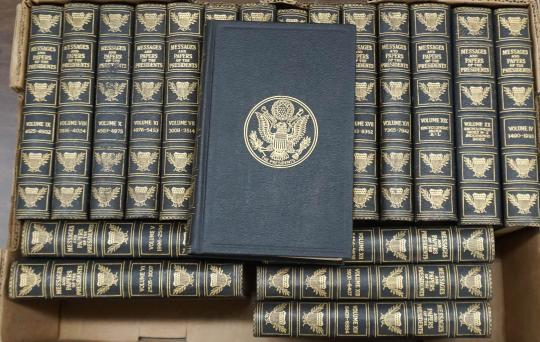
Two other older books that I have from shortly after the turn of the century are a couple of my favorites because they look so cool. One is The Illustrious Life of William McKinley: Our Martyred President, which was published in 1901 right after President McKinley was assassinated:

And I've previously shared these pics of The Life of Pope Leo XIII: From His Personal Memoirs, which was published in 1903, just a few months before Pope Leo XIII died. I don't remember where I got this book, but it's gorgeous and in pretty good edition for a 120-year-old book:


#Books#Book Collection#Library#Books & Libraries#Personal Library#Book Collecting#Bibliophile#My Library#Old Books#William McKinley#President McKinley#Pope Leo XIII#Personal Memoirs of Ulysses S. Grant#Ulysses S. Grant#President Grant#General Grant
14 notes
·
View notes
Text

April 6, 1909
HORSE ASLEEP TWO WEEKS
Animal Cannot Be Aroused from Record-Breaking Slumber.
8 notes
·
View notes
Note
If it had succeeded would Mayorkas have been the first cabinet member ever impeached?
Just to be clear, Secretary Mayorkas was impeached. Impeachment is the first step of the process -- I often suggest that people think of impeachment in the same way that you'd think of an indictment in a criminal proceeding. The House of Representatives is responsible for taking up articles of impeachment and if a simple majority of the House votes to impeach, then that person has been impeached, no matter what happens next.
After that, the next step is taken up by the U.S. Senate where the trial of the impeached official takes place. If there is a trial in the Senate and 2/3rds of the Senate votes to convict the official, then that person is removed from office. But whether they are convicted and acquitted, they still have been impeached.
What happened with Mayorkas is that the House impeached him and when the articles of impeachment were taken up by the Senate, the Senate decided that the charges were a political stunt that did not meet the Constitution's definition of "high crimes and misdemeanors." So, the Senate simply dismissed the charges instead of even proceeding to a trial. But, again, Mayorkas was still impeached; it just didn't go further than that step.
And to actually answer your question, Mayorkas is the second Cabinet member in American history to be impeached. William Belknap, who was Secretary of War under President Grant, was impeached in 1876 for taking kickbacks from traders seeking contracts at military forts on the frontier. When it was clear that he was definitely going to be impeached by the House, Belknap resigned, but despite leaving office he still faced a Senate trial (as President Trump would face with his second impeachment and Senate trial over inciting an insurrection despite his term ending). The Senate tried Belknap on five articles of impeachment and was found guilty on all five by a majority of Senators, but narrowly escaped conviction because the 2/3rds threshold wasn't reached. But despite there being far more Cabinet members than Presidents throughout American history, more Presidents have been impeached than Cabinet Secretaries.
#Impeachment#U.S. Constitution#Politics#Political History#Impeachment of Alejandro Mayorkas#Alejandro Mayorkas#Mayorkas Impeachment#William Belknap#Impeachment of William Belknap#Belknap Impeachment#Reconstruction#Political Scandals#Political Corruption#Grant Administration#Biden Administration#Congress#U.S. House of Representatives#U.S. Senate
10 notes
·
View notes
Text
Road Trip
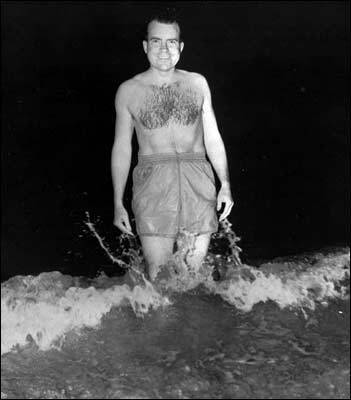
On November 8, 1960, millions of Americans went to the polls in what would become one of the closest Presidential elections in American History: John Fitzgerald Kennedy versus Richard Milhous Nixon.
That morning, Kennedy voted in Boston and Nixon voted in Whittier, California. The candidates had spent months canvassing the nation, working to get every last vote – and every last vote was needed. For the past several weeks, Kennedy and Nixon had criss-crossed the country, debated one another, and been working non-stop to be elected the 35th President of the United States.
After they voted that day, there were results to monitor, precincts to watch, election day problems to take care of, and many other things to worry about. Imagine being on the cusp of the Presidency – with a 50/50 chance of being elected the next President of a superpower in the grip of the Cold War, with the threat of Communism and nuclear weapons hanging over your head, and the hopes of hundreds of millions of people pinned on either your victory or defeat. Imagine being in the position of John F. Kennedy or Richard Nixon on November 8, 1960. What would you do?
John F. Kennedy put the control of his campaign in the hands of his younger brother, Bobby, and then took a nap.
And Richard Nixon took a road trip to Mexico.
Once Nixon voted that morning at a private home in a quiet Whittier neighborhood, he had been scheduled to head to the Ambassador Hotel in Los Angeles (where Bobby Kennedy would be assassinated eight years later) for the Election Day vigil and the long wait for the returns which would indicate whether he would be moving into the White House or facing an early retirement.
Nixon was finished voting by 8:00 AM and hopped into his black Cadillac limousine to be driven to the Ambassador. Several blocks away from the polling place, Nixon ordered the limousine to stop. Along with a military aide and a Secret Service agent, Nixon jumped out of the limo and into a white convertible follow-up car driven by an officer from the Los Angeles Police Department. Nixon took the LAPD officer’s place, got behind the wheel and ditched the press which had been following him.
Driving to La Habra, California, Nixon made a quick visit with his mother, making sure she had voted for her son in the Presidential election. Nixon drove south along the Pacific Coast Highway, with no specific destination. He stopped for gasoline in Oceanside and told a gas station attendant – startled to see the Vice President of the United States on a joyride on the very day that he stood for election as President – “I’m just out for a little ride." Nixon confided that it was his only source of relaxation.
As the group of four men, with Nixon in the driver’s seat, reached San Diego – over two hours away from Nixon’s campaign headquarters at L.A.’s Ambassador Hotel – Nixon pointed out that he hadn’t been to Tijuana in at least 25 years.
As David Pietrusza wrote in his recap of Nixon’s road trip, "Richard Nixon – the ultimate control freak – was winging it on the most important day of his life." Not only that, but the sitting Vice President of the United States and the man who many Americans were choosing to become the next President, impulsively decided to leave the entire country while those voters were still at the polls.
In Tijuana, Nixon and his party headed to a restaurant called Old Heidelberg. Despite the fact it was owned by a German, Border Patrol agents told Nixon that it was the best place in Tijuana for Mexican food. Joined at the last moment by Tijuana’s Mayor, Xicotencati Leyva Aleman, Nixon, his military aide, a Secret Service agent, and an average LAPD officer ate enchiladas in Mexico while John F. Kennedy took a nap in Hyannis Port, Massachusetts.
When Nixon’s press secretary Herb Klein was asked about the missing candidate, he had to tell reporters that Nixon often took some private moments on hectic days such as Election Day. Really, though, Klein had no clue where Nixon was, eventually admitting that the Vice President was "driving around without any destination”.
After lunch in Tijuana, Nixon and his companions headed back north towards the United States border crossing. The LAPD officer took over driving duties as Nixon sat in the convertible’s passenger seat. A shocked Border Patrol guard shook hands with the Vice President and asked the man who was currently on the ballot for the Presidency, “Are you all citizens of the United States?”.
Nixon and company drove to the Mission of San Juan Capistrano, which Nixon called “one of my favorite Catholic places” on the day he faced the first successful Catholic candidate for the Presidency in American History. Nixon took his three companions on a quick, informal tour of the Mission. “For a few minutes, we sat in the empty pews for an interlude of complete escape,” Nixon later recalled.
The missing candidate and his three road trip buddies arrived back in Los Angeles before the election results started rolling in. Nixon had to explain his trip to reporters who had been searching for him all day. “It wasn’t planned. We just started driving and that’s where we wound up.”
In his Memoirs, Nixon didn’t go too far into explaining why he escaped on Election Day, but a paragraph about that day is pretty illuminating:
“After one last frenetic week, it was over. Since the convention in August I had traveled over 65,000 miles and visited all fifty states. I had made 180 scheduled speeches and delivered scores of impromptu talks and informal press conferences. There was nothing more I could have done.”
Except escape to Mexico while JFK slept.
#History#Richard Nixon#President Nixon#Presidents#Presidential History#1960 Election#Presidential Elections#Politics#Political History#Nixon vs. Kennedy#Election Day#Election History#Presidential Politics#Nixon#Nixon Library#John F. Kennedy#JFK#President Kennedy#Presidential Campaigns#Campaign History
25 notes
·
View notes
Text

I wish I was in Sacramento so I could give @pelicanhypeman's Warriors a ride back to the Bay.
(GO KINGS!)
8 notes
·
View notes
Text
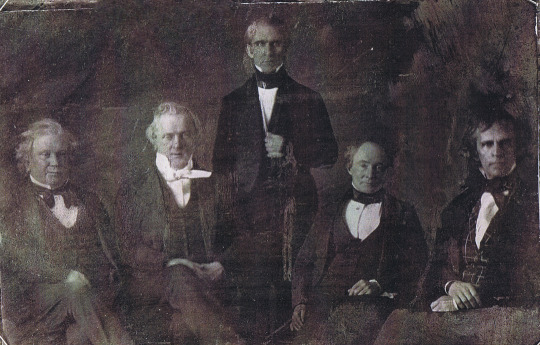
"I had learned this morning that Mr. Buchanan had taken exception to my remark on Saturday last that I should feel that I was deserted by my political family if the members of my Cabinet should call on the President-elect before he called on me. The remark was made because it might have happened that if my Cabinet called on General Taylor he might not afterwards have chosen to call on me at all. As General Taylor belongs to a different political party from myself, and as it was his duty to call on me, if he desired to exchange civilities, I thought it was due to their own self-respect as well as to me that my Cabinet should wait until General Taylor paid his respects to me before they paid their respects to him. In this view all the members of the Cabinet expressed their concurrence on Saturday, except Mr. Buchanan. I learned this morning that Mr. Buchanan had said to a member of the Cabinet that notwithstanding my remark on Saturday he had left the Cabinet-room resolved to call on General Taylor on that day, as General Shields by appointment had called at the State Department to accompany him. He did not, however, do so; but called on General Taylor yesterday, immediately after General Taylor had called on me. Mr. Buchanan is an able man, but is in small matters without judgment and sometimes acts like an old maid."
-- President James K. Polk, on his Secretary of State James Buchanan, shortly before the inauguration of Polk's successor, President-elect Zachary Taylor, in an entry in Polk's remarkable and often immensely petty personal diary (which he religiously updated throughout his Presidency), February 27, 1849.
#History#Presidents#Presidential History#Presidential Quotes#Quotes by Presidents#James K. Polk#President Polk#Polk Administration#James Buchanan#President Buchanan#Zachary Taylor#General Taylor#President Taylor#Inauguration of Zachary Taylor#Presidential Transitions#1848 Election#Politics#Political History#Political Quotes#Political Rivalries#Presidential Rivals#Presidential Rivalries#Presidential Feuds#Presidential Relationships#Diary of James K. Polk#Presidential Diaries#Cabinet of James K. Polk
8 notes
·
View notes
Text
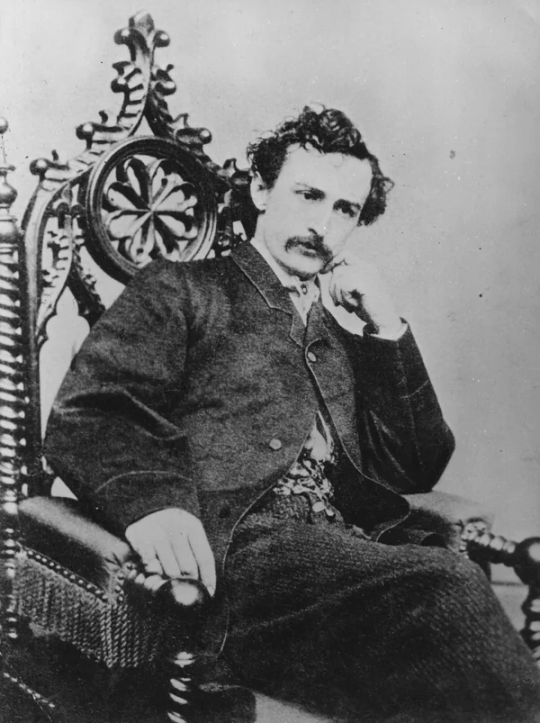

Booth had died onstage dozens of times in Richard III, Hamlet, and Shakespeare's other great tragedies, but tonight he was not playacting. He wanted to go down fighting, not hang like a petty thief. "I have too great a soul to die like a criminal," he wrote in his diary a few nights before. "Oh may he, may he spare me that and let me die bravely." For Booth, this was his final and greatest performance, not just for the small audience of soldiers at the improvised theatre of Garrett's farm, but also for history.
He had already perpetrated the most flamboyant public murder in American history. Indeed, Booth had not only committed murder, he had performed it, fully staged before a packed house. At Ford's Theatre, Booth broke the fourth wall between artist and audience by creating a new, dark art -- performance assassination.
-- James L. Swanson, Manhunt: The 12-Day Chase for Lincoln's Killer (BOOK | KINDLE | AUDIO)
#History#Assassination of Abraham Lincoln#Lincoln Assassination#John Wilkes Booth#Booth Conspiracy#Booth Manhunt#Abraham Lincoln#President Lincoln#Death of Abraham Lincoln#Death of John Wilkes Booth#Assassins#Presidential History#Presidents#Presidential Assassinations#Presidential Assassins#Assassinations#Political History#Political Assassinations#James L. Swanson#Manhunt: The 12-Day Chase for Lincoln's Killer#Ford's Theatre
14 notes
·
View notes
Text
“The Evil That Men Do Lives After Them”: John Wilkes Booth’s Final Performance
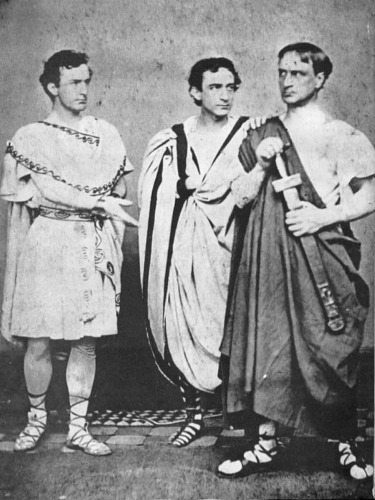
“There is no sure foundation set on blood,
No certain life achieved by another’s death”
– William Shakespeare, King John
Shakespeare killed Kings and Princes and lovers and warriors with beauty and artistry. With eternally evocative words as his lethal weapon, the bard snatched literary lives out of pages and off of stages in nearly every play that he penned. Sometimes he killed out of love, sometimes he killed out of hate, sometimes he killed for power, or because of weakness, or in spite of strength. When Shakespeare killed, however, he did it with purpose and poetry. In Shakespeare’s work, murder wasn’t simply committed – it was composed and performed; and, in the centuries since that work was created, it has been left up to actors to breathe life into scenes of death. A good actor can convince the audience to believe; a great actor can convince himself.
Contrary to what many people believe, John Wilkes Booth was neither the most famous nor the best actor in the United States when he assassinated President Abraham Lincoln in April 1865. Booth’s father, Junius Brutus Booth, was probably the greatest actor in the world when he was at his best and when he stayed sober. Of the three sons (all of illegitimate birth) who followed Booth, who died in 1852, into the theater it was his second-eldest, Edwin, who was the most amazing to watch on stage. Edwin traveled the world and not only played all of the parts made famous by his father, but arguably did it better. An Edwin Booth performance was a mesmerizing experience for a theater-goer, and it made him a very wealthy, well-connected man. The eldest son, Junius Jr., was a talented actor, but never quite had his heart completely in the theater, despite his natural abilities. The youngest of the Booth sons, John Wilkes, was determined to be as great as his father and two brothers, but he lacked the talent that seemed instinctive with his father and inherited by his older brothers.
John Wilkes Booth’s determination and ambition, however, drove him to do things on stage that other actors wouldn’t risk. While he wasn’t the most famous or most talented actor in America, John Wilkes was widely considered the most handsome, and women swooned over his appearance, buying stereograph pictures and anything that captured the young actor’s brooding appearance. If John Wilkes couldn’t measure up to his father or his brothers when reciting his lines, his charismatic presence and remarkable physicality captivated crowds. Uniquely athletic, Booth would take tremendous risks on stage, performing stunts that stunned audiences and helped hide any defects in his acting ability.
If John Wilkes didn’t play the roles as well as Edwin did, he tackled them with unparalleled energy and was certainly one of the most well-known names in American entertainment by the 1860s. Booth played a multitude of roles, but the role that he felt suited him best – the role that inspired him in so many ways – was that of Brutus in Julius Caesar. Booth saw Brutus in the same light as Marc Antony did in the closing lines of Shakespeare’s masterpiece – a patriot who risked everything to bring down a tyrant, and, as Antony said, “was the noblest Roman of them all”.
The Booths were from Maryland originally, a border state during the Civil War, but the two most visible members of the family – Edwin and John Wilkes – seemed to come from different worlds. Edwin was a staunch Unionist who lived in New York and was a friend to Presidents, Northern politicians, Union soldiers, and captains of industry. John Wilkes was an avowed secessionist and Southern sympathizer. When John Brown was hanged in Virginia in 1858, Booth dressed as a member of a Richmond militia group in order to get a front row seat at the abolitionist’s execution. When the war started in 1861, John Wilkes was open about his support for the states which seceded and formed the Confederate State of America, and his vociferous opinions landed him in trouble in some of the Northern cities that he performed in.
The relationship between Edwin and John Wilkes was never strong, and the younger brother nursed a deep jealousy for the more acclaimed (and far more wealthy) Edwin. Their opposing beliefs about the Civil War further endangered their relationship and, at one point, Edwin kicked John Wilkes out of his home in New York when John Wilkes insulted President Lincoln and praised the Confederacy. At some point, John Wilkes went from a sympathizer to an activist. Booth smuggled medicine to the Southern states and may have been involved in deeper operations as a member of the Confederate Secret Service. Booth’s fame and active career in the theater was helpful to the cause, as he was able to travel throughout the country with relative ease.
One thing that was clear about John Wilkes Booth is that he absolutely hated Abraham Lincoln.
The Booths were no strangers to Lincoln. More than anything else, Lincoln loved the theater, particularly Shakespeare, which he often read out loud to guests at the White House. Lincoln had seen Edwin Booth on numerous occasions, and on November 9, 1863 – 10 days before he traveled to Pennsylvania to deliver the Gettysburg Address – the President watched John Wilkes Booth as Raphael in The Marble Heart at Ford’s Theatre, several blocks from the White House. Lincoln was impressed by Booth’s performance, but one of Lincoln’s companions that night, Mary Clay, daughter of Lincoln’s Minister to Russia, remembered a portentous moment. On several occasions, Booth – playing a villain – uttered his lines with anger while seemingly shaking his finger at President Lincoln. Mary Clay recalled saying to the President, “Mr. Lincoln, he looks as if he meant that for you.” Lincoln responded, “Well, he does look pretty sharp at me, doesn’t he?” Booth reportedly refused an invitation to meet the President after the performance, but after Lincoln’s young son, Tad, watched in awe as Booth energetically performed in another play, the future assassin gave the President’s son a rose.
A performance that Lincoln certainly would have enjoyed seeing took place on November 25, 1864 at Edwin Booth’s Winter Garden Theatre in New York City. In a special benefit, the three sons of Junius Brutus Booth performed together for the first and only time. Edwin, Junius Jr., and John Wilkes teamed up to perform Julius Caesar, with the goal of raising money for a statue of William Shakespeare – a statue that can be found in Central Park today. While Edwin took the plum role of Brutus and Junius Jr. played Cassius, John Wilkes played the role that would become most unlikely in hindsight: Marc Antony. During the performance by the Booth brothers, Confederate agents set fire to buildings around New York City, including one next to Edwin’s theatre. After a momentary panic in the building, the audience was calmed down and the show went on. John Wilkes Booth had few acting roles left in his career, but by this point, he had decided that his final role would be Brutus.
By the time of the Winter Garden Theatre benefit featuring the Booth brothers, John Wilkes had already been conspiring to kidnap Abraham Lincoln in order to trade the President for a significant number of Confederate soldiers being held in Union POW camps. Booth’s audacious plan to capture the President of the United States in the midst of a bloody and brutal Civil War was devised during meetings with fellow conspirators such as Lewis Powell, John Surratt, David Herold, George Azterodt, Samuel Arnold, and Michael O'Laughlen at Mary Surratt’s boarding house in Washington, D.C. When Lincoln was sworn in for his second term on March 4, 1865, Booth and some of his conspirators were in the crowd and can be seen in a photo of the Inaugural stand at the Capitol as Lincoln gave his Inaugural Address. Over the next two weeks, the conspirators looked for an opportunity to kidnap the President and hopefully turn the tide for the Confederacy.
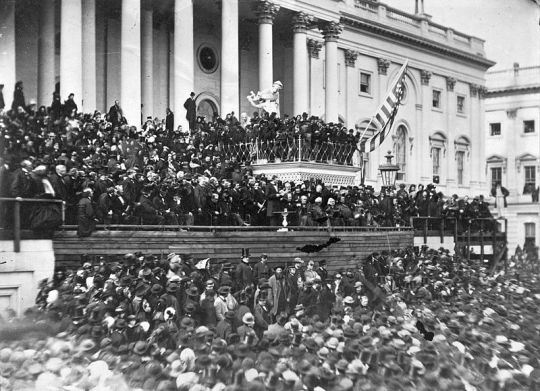
On March 17, 1865, Booth and his gang planned to launch their operation when President Lincoln traveled to the Campbell Hospital on the outskirts of the nation’s capital. Unfortunately for Booth, Lincoln’s plans changed and the abduction plot fell through. The next night, Booth gave his final acting performance, as Duke Pescara in The Apostate, at Ford’s Theatre.
•••
“I have no words;
My voice is in my sword”
– William Shakespeare, Macbeth
Everything changed for John Wilkes Booth on April 9, 1865, as news reached Washington that Confederate General Robert E. Lee had surrendered his Army of Northern Virginia to Union General Ulysses S. Grant at Appomattox Court House, Virginia. Two nights later, Booth was in a crowd celebrating at the White House and became enraged when he heard President Lincoln suggest in an extemporaneous speech that blacks would be given the right to vote. That fury multiplied when Lincoln said, “I have always thought ‘Dixie’ one of the best tunes I have ever heard. Our adversaries over the way attempted to appropriate it, but I insisted yesterday that we fairly captured it…I now request the band to favor me with its performance…[for] it is good to show the rebels that with us they will be free to hear it again.” Booth took Lincoln’s words as an almost personal affront. The abduction plan was off the table, but Booth instantly realized that he would kill Lincoln. In his mind, he would be Brutus slaying the tyrant Caesar.
We know what happened next. Shakespeare killed with beauty and poetry – deadly, 400-year-old lines that elicit timeless emotions. There was no beauty in what happened at Ford’s Theatre on April 14, 1865. President Lincoln sat in his box watching Our American Cousin. Booth slipped into the theatre – his famous and familiar face was a passport for entry. The actor crept into the room behind the President and waited for an audience reaction that would mask his movement. As soon as the crowd laughed at a line delivered on stage a single gunshot rang out. A .44 caliber lead ball slammed into the back of Lincoln’s head. Skull fragments carried by the the bullet sliced through the President’s brain. Lincoln slumped forward, almost certainly brain dead already. Booth brandished a dagger, slashed Lincoln’s guest in the Presidential box, Major Henry Rathbone, and performed one last leap on to the stage – one last acrobatic move to stun an audience. However, in an unusual move for Booth, he stumbled, caught a leg in the flags draped in front of Lincoln’s box, and landed awkwardly. Booth’s tibia cracked and he limped off the stage, dragging his broken leg behind him. With fire in his eyes, the youngest member of the Booth acting family turned to the crowd, and with one last act of stagecraft yelled “Sic Semper Tyrannis!”. The line wasn’t part of a play; it was Virginia’s state motto and it meant “Thus Always To Tyrants”. Some witnesses remember hearing Booth add, “The South is avenged!”.
Lincoln was carried across the street and his 6'4" frame was laid diagonally on a bed in William A. Petersen’s boarding house. The powerfully-built, 56-year-old President survived longer than most humans would survive a point-blank gunshot wound to the back of the head – even with today’s medical advancements. At 7:22 AM on April 15, 1865, Lincoln stopped breathing, and Secretary of War Edwin Stanton uttered the famous words, “Now, he belongs to the ages.”
Over the next 10 days, John Wilkes Booth rode through the war-torn countryside of Maryland and Virginia. Shooting pain from his broken leg made every step and every breath excruciating, even after the injury was set by Dr. Samuel Mudd. With his fellow conspirator David Herold, Booth hid from the largest manhunt in American History, as bloodthirsty Union troops, many just back from the battlefields of the Civil War, chased the man who killed the President that guided them through that crisis.
For 26-year-old John Wilkes Booth, there was a deeper pain. It wasn’t just the broken leg, or the hunger, or the exhaustion of evading an entire army. It wasn’t the lifelong envy of his more successful older brother, or the fact that his fellow conspirators failed in their assignments as Booth accomplished his. For Booth, who idolized Brutus and saw himself as the Southern, if not American version of Caesar’s assassin, the pain was due to the fact that he wasn’t being celebrated for removing a “tyrant”. John Wilkes Booth was used to seeing his name on posters that advertised his appearance, but now, his name was on wanted posters offering a $100,000 reward for his capture. Even the South mourned the loss of Lincoln, who looked forward to a gentle reconciliation and reconstruction with the former Confederate States. Booth’s assassination of the American President wasn’t seen as a heroic act against a raging tyrant. Jefferson Davis, the President of the Confederate States of America that Booth so deeply supported would later say that “Next to the destruction of the Confederacy, the death of Abraham Lincoln was the darkest day the South has ever known.”
Instead of Brutus, Booth was seen as one of the murderers of the the Scottish king Duncan, who told Macbeth:
“I am one, my liege,
Whom the vile blows and buffets of the world
Hath so incens’d that I am reckless what
I do to spite the world”
•••
“Life’s but a walking shadow, a poor player
That struts and frets his hour upon the stage”
– William Shakespeare, Macbeth
In his final days, as he was being hunted down in the woods of Virginia, and before he was cornered in a burning barn and shot to death, Booth came to the bitter realization that the assassination would not lead him to the glory he had always sought. As always, though, John Wilkes Booth felt that it wasn’t his fault – that it was the world that let him down. On the run, before he was killed, Booth scrawled a few lines in a diary that was found on him when the Union troops finally caught up to him on April 26, 1865:
“Until today nothing was ever thought of sacrificing to our country’s wrongs. For six months we had worked to capture, but our cause being almost lost, something decisive and great must be done. But its failure was owing to others, who did not strike for their country with a heart. I struck boldly, and not as the papers say. I walked with a firm step through a thousand of his friends, was stopped, but pushed on. A colonel was at his side. I shouted Sic semper before I fired. In jumping broke my leg. I passed all his pickets, rode sixty miles that night with the bone of my leg tearing the flesh at every jump. I can never repent it, though we hated to kill. Our country owed all her troubles to him, and God simply made me the instrument of his punishment. The country is not what it was. This forced Union is not what I have loved. I care not what becomes of me. I have no desire to outlive my country. The night before the deed I wrote a long article and left it for one of the editors of the National Intelligencer, in which I fully set forth our reasons for our proceedings…
After being hunted like a dog through swamps, woods, and last night being chased by gunboats till I was forced to return wet, cold, and starving, with every man’s hand against me, I am here in despair. And why? For doing what Brutus was honored for? What made [William] Tell a hero? And yet I, for striking down a greater tyrant than they ever knew, am looked upon as a common cutthroat. My action was purer than either of theirs. One hoped to be great himself. The other had not only his country’s but his own, wrongs to avenge. I hoped for no gain. I knew no private wrong. I struck for my country and that alone. A country that groaned beneath this tyranny, and prayed for this end, and yet now behold the cold hands they extend to me. God cannot pardon me if I have done wrong. Yet I cannot see my wrong except in serving a degenerate people. The little, the very little, I left behind to clear my name, the Government will not allow to be printed. So ends all. For my country I have given up all that makes life sweet and holy, brought misery upon my family, and am sure there is no pardon in the Heaven for me, since man condemns me so…
Tonight I will once more try the river with the intent to cross. Though I have a greater desire and almost a mind to return to Washington, and in a measure clear my name – which I feel I can do. I do not repent the blow I struck. I may before my God, but not to man. I think I have done well. Though I am abandoned, with the curse of Cain upon me, when, if the world knew my heart, that one blow would have made me great, though I did desire no greatness. Tonight I try to escape these bloodhounds once more. Who, who can read his fate? God’s will be done. I have too great a soul to die like a criminal…”
•••
“O villain, villain, smiling, damned villain!” – William Shakespeare, Hamlet
Cornered in a barn on Pat Garrett’s tobacco farm in Port Royal, Virginia, John Wilkes Booth refused to surrender to the Union troops who had been hunting him for twelve days, even after the soldiers set fire to the barn and Booth’s co-conspirator, David Herold, gave himself up. Limping around in the burning barn, a bullet fired by a Union soldier sliced through Booth’s neck, paralyzing the assassin. Soldiers dragged him from the barn, but the wound was mortal. In the moments before he died, Booth asked to see his own hands because the bullet through his spinal cord had robbed him of the ability to move on his own. When a soldier lifted Booth’s hands to his face, the 26-year-old actor who killed Abraham Lincoln mumbled his final words: “Useless! Useless!”
#History#Assassination of Abraham Lincoln#Abraham Lincoln#President Lincoln#Lincoln Assassination#Civil War#Civil War History#John Wilkes Booth#Edwin Booth#Presidents#Presidential History#Presidential Assassinations#Presidential Assassins#Assassinations#Assassins#William Shakespeare#Shakespeare#Julius Caesar#Brutus#Booth Family#Junius Booth#Death of Abraham Lincoln#Manhunt#John Wilkes Booth Manhunt#Booth Conspiracy#The Evil That Men Do#The Evil That Men Do: John Wilkes Booth's Final Performance#Political Assassinations#Political History
86 notes
·
View notes
Text

"Graphic art was powerless before a face that moved through a thousand delicate gradations of line and contour, light and shade, sparkle of the eye and curve of the lip, in the long gamut of expression from grave to gay, and back again from the rollicking jollity of laughter to that far-away look."
-- John G. Nicolay, Abraham Lincoln's private secretary
•••
To borrow one of his most famous oratorical devices, it was ten score and 15 years ago that Abraham Lincoln entered life and began one of America's most unlikely and extraordinary journeys, and 159 years since that journey ended because of an assassin's bullet. To us, Lincoln will always be a statue; a painting; a bust on Mount Rushmore; a monument on the Washington Mall; a solid, stoic, staid symbol staring back at us from a dull, green five-dollar bill, a rusty-looking penny, or a black-and-white photograph. Yet, he was one of us -- a human just as colorful as any American that has ever existed, and through his rise and his triumph, he told us a story that Republicans claim as the standard for their party, that Democrats claim as the inspiration for their party, and that Independents of all backgrounds do not dare to turn away from.
Lincoln's story is so extraordinary that we don't even think of him as a member of our species. He's on a higher level. He's almost mythological. A legend. We see his face like we envision the face of God. The halo surrounding him almost downplays the fact that he lived the same way we live. He needed oxygen and water and food. We all have sensitivities about how we are perceived by others, and Lincoln was no different. To many of his contemporaries, he was a freakishly tall, gangly, ugly man. During his life, people called him a "baboon" and "a barbarian." The man that Lincoln placed in command of all Union troops, General George B. McClellan, referred to the President as "the original gorilla." They made fun of his high-pitched, nasally voice. They made fun of his country accent -- the way that he pronounced "chair as "cheer" and said "hain't" instead of "haven't." They laughed at his careless clothing choices, and snickered at the fact that he never combed his hair. When he delivered the Gettysburg Address in 1863, one Pennsylvania newspaper wrote, "We pass over the silly remarks of the President. For the credit of the nation we are willing that the veil of oblivion shall be dropped over them, and they shall be no more repeated or thought of."
In Lincoln's lifetime, more people probably rolled their eyes instead of listened intently when he launched into yet another backwoods joke or funny anecdote that he couldn't stop repeating. He had family problems. His mother died when he was very young, and he had lifelong daddy issues. His borderline crazy wife was domineering, emotionally (and allegedly physically) abusive, and his young children ran roughshod over the White House. He had no real close friends and experienced devastating heartbreak -- including a love that was lost and the deaths of two of his young children. He was simultaneously considered inexperienced and weak, heavy-handed and harsh.
"Honest Abe" was the cleverest, sharpest, and most vicious politician of his time. The gentle and joking country politician destroyed his enemies, threatened his opponents, and steamrolled his rivals. This beacon of liberty and protector of freedom bypassed the Constitution and suspended Habeas Corpus. Abraham Lincoln began his Presidency intending to save the Union in whichever way possible -- even if it meant allowing slavery to continue. The "peculiar institution" was abhorrent to his beliefs, but an acceptable sacrifice if the result was the Union's survival. Until he finally reached a point where he recognized that the sacrifices being made during the Civil War were exactly the kind of bloody price that needed to paid to cleanse the nation of its original sin of slavery.
Like many, if not all, of our greatest leaders, Abraham Lincoln was a man full of paradoxes. Beneath the solemn visage that was Lincoln's complex face was a cheerful, jovial, informal man who loved nothing more than a good joke or a witty story. Yet, further beneath that genial layer was also a dark, depressed man who lost the love of his life when he was young, seriously considered suicide on numerous occasions, felt unsatisfied with his accomplishments and about his qualifications, and faced the death of his favorite child while he wrestled with the biggest crisis that this country has ever faced.
Lincoln may have have been our nation's greatest orator, perhaps even America's greatest pure writer. His writing -- and not just his speeches, but his private letters and messages to Congress -- is memorable and poetic. If the Civil War was a symphony, his words were the lyrics to its beautifully terrible music. When the war was going badly, he used his words to simultaneously challenge his generals, assuage the public, and exert his control over the many crises his country faced. When the war was going well, his words were soothing, inspirational, and a bridge to the South that invited capitulation without humiliation. Lincoln's words were the words of a writer who spent all of his life studying the English language, yet Lincoln was largely self-educated by the light of a candle in a dark, damp log cabin.
We will never know why it was Abraham Lincoln -- a virtually unknown frontier lawyer who had served just one term in Congress a decade before he even ran for the Presidency -- who was destined to lead the United States through the Civil War, but can we even imagine another person equipped to do so? Like a shooting star, Lincoln appeared and against all odds, he saved the Union. Then, when the war ended, he disappeared again. Not a day earlier or a day later, either -- on literally the first day that he truly felt that the Civil War had ended, Abraham Lincoln was assassinated, arguably the last casualty of the Civil War.
So, the next time you think that all hope is lost or that you've failed at something or that you are "only human," think or Abraham Lincoln, who overcame a lifetime of obstacles and challenges and failures to save the Union that he loved and believed in and became a legend and hero to the world today. Remember that we are "only human," but so was Abraham Lincoln. You could be a lot worse off than being "only human."

The rocking chair that President Lincoln was sitting in when he was shot by John Wilkes Booth on April 14, 1865, now on display at the Henry Ford Museum, Dearborn, Michigan.
#History#Abraham Lincoln#President Lincoln#Civil War#Death of Abraham Lincoln#Assassination of Abraham Lincoln#Lincoln Assassination#Presidents#Presidential History#Lincoln Administration#Lincoln#Politics#Political History#Civil War History#Anniversary of Lincoln's Death
16 notes
·
View notes
Text
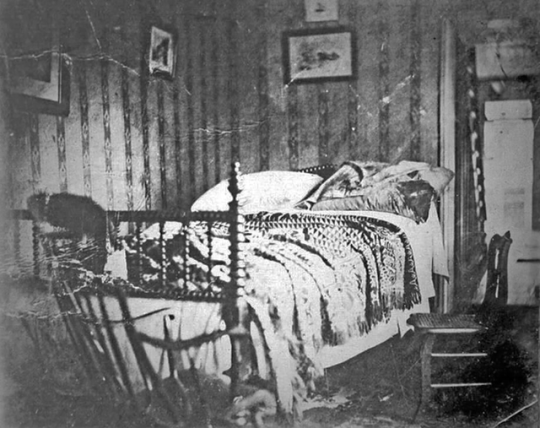
After President Abraham Lincoln was shot during a performance of Our American Cousin at Ford's Theatre, several doctors who were in the audience and also enjoying the play rushed into the Presidential Box and began attending to the President. It was clear that Lincoln's wounds were almost certainly mortal, but the doctors still attempted to save his life. Originally thinking that the President had been stabbed, they soon found that he had been shot behind the left ear and the bullet -- a 43.75 mm ball which had been fired by John Wilkes Booth's .44 caliber Derringer -- had sliced through Lincoln's brain and lodged behind his eye sockets without exiting the skull. When Lincoln's breathing became more shallow, Dr. Charles Leale used his finger to remove blood clots from the wound, which immediately improved Lincoln's respiration.
The doctors decided to move Lincoln from the theater, but felt that the President's condition was far too weak to risk taking him back to the White House, which was several blocks away. A nearby saloon was considered just as unseemly of a place for the President to spend his last hours and likely die in as a theatre, so Lincoln was carried across the 10th Street to William Petersen's boarding house. When they brought Lincoln into the boarding house, they realized that the 6'4" President was too tall for the bed they found for him, so they laid him diagonally upon it.
It was obvious that Lincoln could not survive his wound, so the attending doctors simply tried to keep him comfortable in his final hours by clearing the blood clots in his skull that caused his breathing to become more labored. Throughout the night, the President never regained consciousness, but witnesses said that he looked peaceful as his life was drawing to a close. The only visible evidence of his mortal wound were the bloody pillows that his head rested on and the raccoon-like bruising around Lincoln's eye sockets due to the orbital bones fractured by Booth's bullet after it passed through his brain. Nine hours after he was shot, Lincoln died in Petersen's Boarding House at the age of 56.
Shortly after the President was pronounced dead, his body was placed in a coffin and transferred back to the White House in a carriage. Just a few hours later, one of the residents of Petersen's Boarding House, Julius Ulke, took a photograph (seen at the beginning of this post) of the room and the bed -- including a pillow soaked with the President's blood -- where Lincoln had died earlier that morning.

The room in Petersen's Boarding House where Abraham Lincoln died, pictured in 2007.
#History#Abraham Lincoln#President Lincoln#Death of Abraham Lincoln#Assassination of Abraham Lincoln#Lincoln Assassination#Presidents#Presidential History#Presidential Assassinations#John Wilkes Booth#Assassins#Assassinations#Political History#Civil War#Civil War History#Petersen's Boarding House#Ford's Theatre#Presidential Deaths#Our American Cousin
36 notes
·
View notes
Text
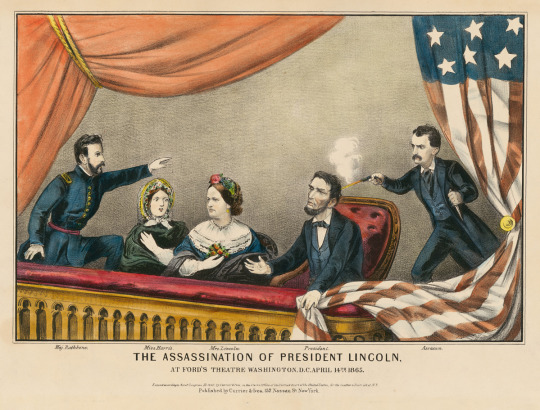
Today is the 159th anniversary of Abraham Lincoln's death, which took place at 7:22 AM on April 15, 1865, about nine hours after he was shot in the head by John Wilkes Booth at Ford's Theatre. So check back throughout the day for a few posts about Lincoln, the assassination, and Booth.

#History#Abraham Lincoln#President Lincoln#Assassination of Abraham Lincoln#Lincoln Assassination#Death of Abraham Lincoln#Presidents#Presidential History#John Wilkes Booth#Presidential Assassinations#Presidential Assassins#Civil War#Civil War History#Anniversary of Lincoln's Death#Presidential Deaths
22 notes
·
View notes
Text
youtube
This was one of craziest endings to any fight I've ever seen. Max Holloway had pretty clearly won four of the five rounds and could have coasted for the final ten seconds of the fight and enjoyed his victory. Instead, he urged Justin Gaethje to stand in the middle of the cage and throw down with him and ended up knocking him out with literally one second left in a 25-minute fight. Holloway made the BMF Championship into a real thing.
#UFC 300#Max Holloway#Justin Gaethje#BMF Championship#BMF#Holloway vs. Gaethje#MMA#UFC#Martial Arts#Mixed Martial Arts#Youtube
1 note
·
View note
Text

As [House] minority leader, [Gerald] Ford had rarely left the White House without pocketing a handful of elegant matchbooks for deposit in a bowl on the receptionist's desk in his Capitol Hill office. Constituents scooped them up, the perfect souvenir of their brush with history. Ford continued the practice while acclimating himself to his new status [as President], no longer a tourist but not yet at home within the walls that had sheltered Jefferson, Lincoln, and the Roosevelts. Scarcely able to believe the latest turn of events, recalled newsman Bob Schieffer, "he would go around and every once in a while he would just pick up a handful of those White House matches because he'd just been doing it all his life."
-- Richard Norton Smith, on Gerald Ford still feeling like a tourist in the White House and hoarding souvenir matchbooks after becoming President in 1974, An Ordinary Man: The Surprising Life and Historic Presidency of Gerald R. Ford (BOOK | KINDLE | AUDIO), which was just released in paperback.
#History#Gerald Ford#President Ford#Ford Administration#Gerald R. Ford#Richard Norton Smith#An Ordinary Man: The Surprising Life and Historic Presidency of Gerald R. Ford#Harper#HarperCollins#Presidents#Presidency#Presidential History#White House#White House History#Books About Presidents#Quotes About Presidents#Presidential Biographies#Resignation of Richard Nixon#Nixon Resignation#Inauguration of Gerald Ford#Ford Inauguration
9 notes
·
View notes
Text
He's just sitting there... ✨menacingly✨
Please enjoy meeting our resident Slowly Melting Wax Nixon Head, he lives in the California History Room and he does not have eyes.
83 notes
·
View notes
Note
I love your "historically accurate transcriptions" and wish you would publish a book of them. Which one do you think is the funniest?
Thank you! Back when Funny Or Die was an actual thing and we were posting them on that site too, there was some discussion of a book but it didn't get much further than the early stages. And then I forgot how to write, so that killed everything.
The two that I'm probably most fond of would be the Reagan/Clinton jellybean one and LBJ's inauguration on Air Force One in Dallas after JFK's assassination. Those are the ones I think are the best from start-to-finish. A lot of the Historically Accurate Transcriptions don't hold up very well in 2024, and I'd probably get canceled if I posted most of them now.
(I also can't resist pointing out that I'm still immensely proud of one particular line from the Hoover/FDR post where Hoover is criticizing FDR for not standing up for him when they meet and FDR says, "My legs are like Americans after four years of your Presidency, Mr. Hoover: They don't work." In my personal opinion, that might be the funniest thing I've ever written in any medium.)
6 notes
·
View notes
Text
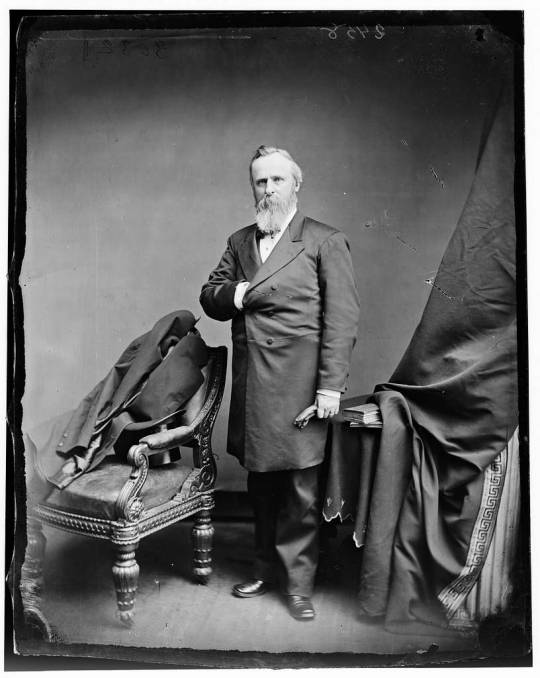
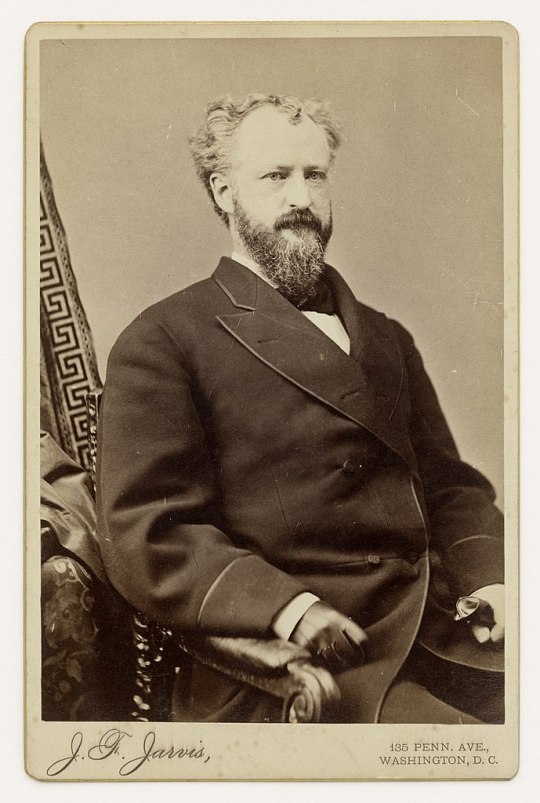

"If there are any two men in the Country whose opposition and hatred are a certificate of good character and sound Statesmanship they are [Roscoe] Conkling and [Benjamin F.] Butler. I enjoy the satisfaction of being fully endorsed by the hatred and opposition of both of these men."
-- President Rutherford B. Hayes, on his Radical Republican political rivals -- Senator Roscoe Conkling of New York and former Congressman Benjamin F. Butler of Massachusetts -- in a personal diary entry, January 16, 1881
#History#Rutherford B. Hayes#President Hayes#Hayes Administration#Presidential Quotes#Quotes by Presidents#Politics#Political Rivals#Political Feuds#Roscoe Conkling#Benjamin F. Butler#Presidential Rivals#Presidential Politics#Presidential History#Political History#Political Quotes#Radical Republicans#Reconstruction
12 notes
·
View notes